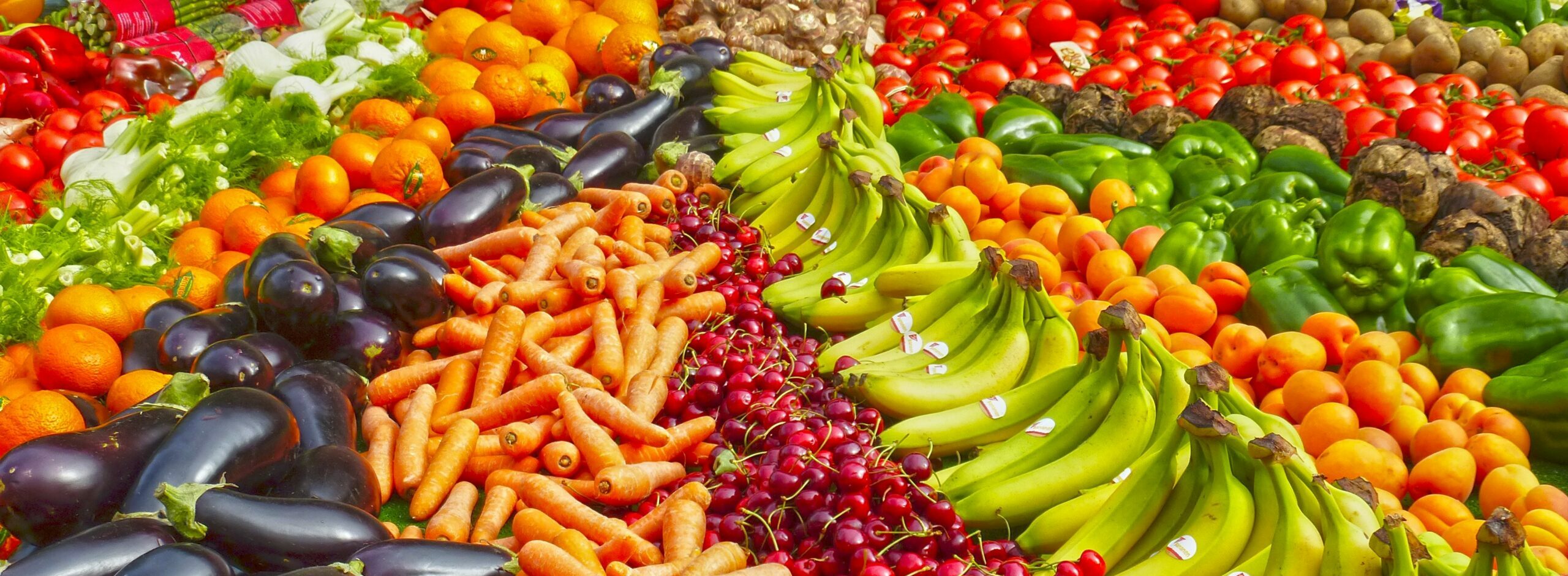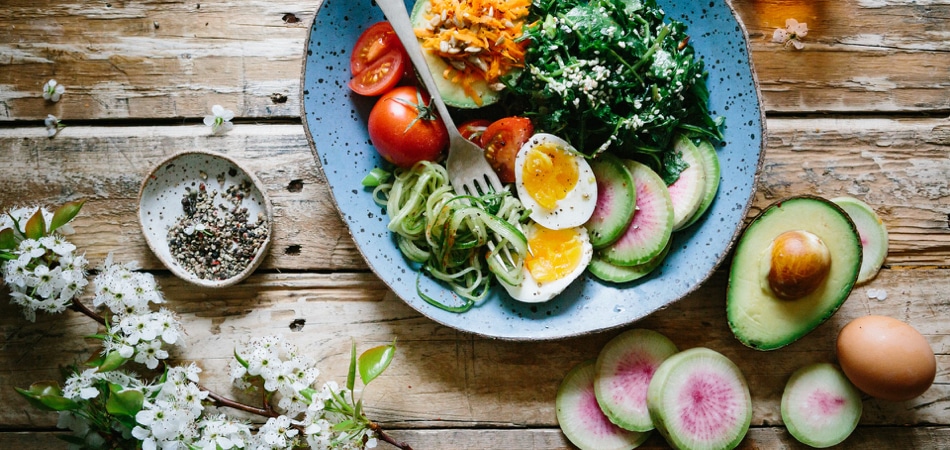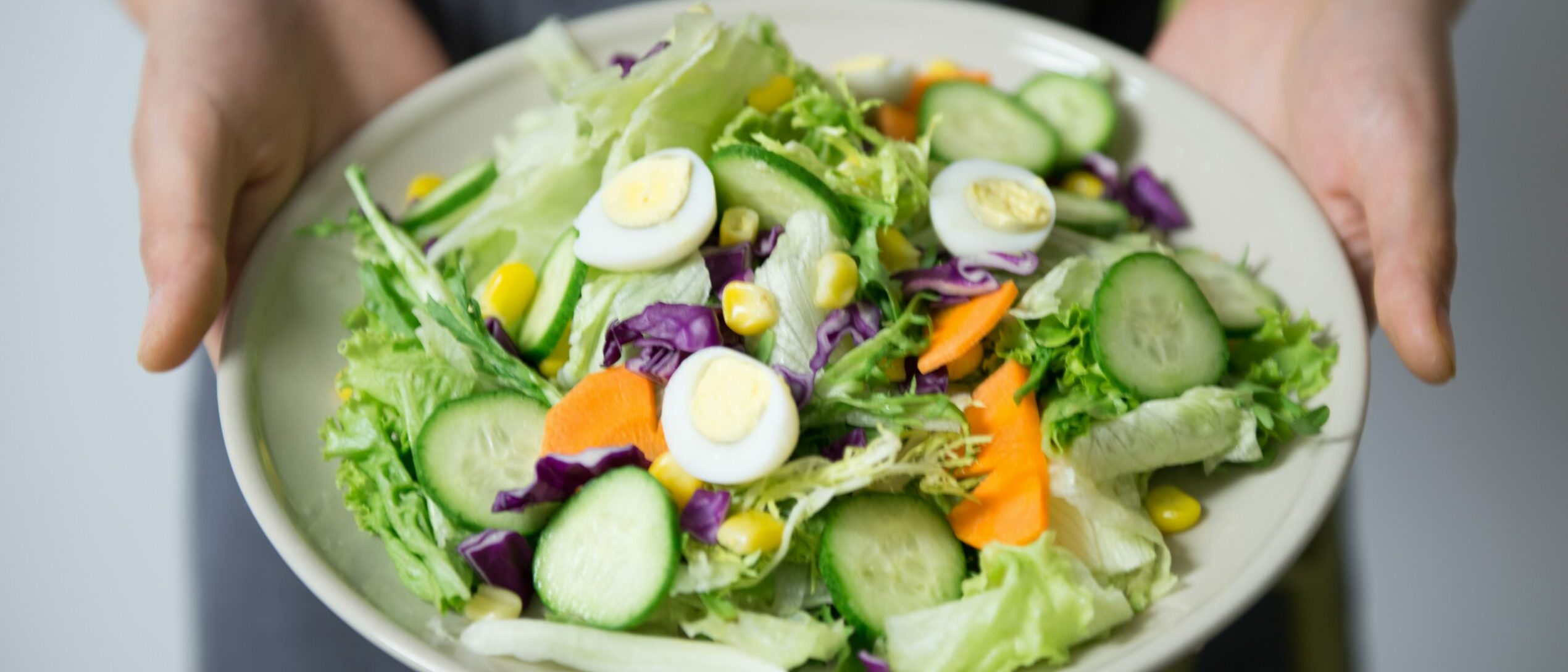Fertility Nutrition explains the dietary principles that are important for good fertility and when planning a pregnancy to give you the best chance of conceiving and having a healthy pregnancy and a healthy baby. It provides evidence-based information on what to eat and why good diet before pregnancy is so important for the future health of your child. Reliable scientific information underpins everything we do and helps you to get ready for pregnancy.
The Fertility Diet
Eating a healthy diet before as well as during pregnancy may boost your fertility and helps ensure you have all the nutrients you need to provide for your baby during pregnancy. In this section we look at:
- Can a good diet really improve fertility?
- The importance of a good diet
- Nutrition for fertility and pregnancy
- Dietary principles
- Your personalised fertility diet
- Fertility-friendly foods

Can a good diet really improve fertility?
There is lots of evidence to show an association between healthy dietary patterns and good fertility (we look at some of these studies in Nutrition for fertility and pregnancy below). Equally, research shows a strong association between unhealthy diets and poorer fertility, including a reduced chance of success with fertility treatment. Whilst it is difficult to draw firm conclusions from epidemiological dietary studies as to direct causes because of the complexity of teasing out the effects of different aspects of diet, lifestyle, and body weight on reproductive health (though researchers do take these things into account when interpreting the data), there is so much research to support this concept. This includes evidence from animal and laboratory studies on sperm and eggs, which explains what is going on at a cellular level. However, there is an awful lot of misinformation circulating online, including that dairy and gluten are universally bad for fertility. Whilst some people may have intolerances and conditions such as Coeliac Disease, making it necessary to remove these types of foods from their diet, this isn’t the case for everyone. The Fertility Guide from Balance Fertility and our courses provide reliable, evidence-based information that helps you separate fact from fiction and interpret the research so that you can adopt the best diet for your individual fertility.
The importance of a good fertility diet
Improving your diet is the first step when planning pregnancy as every stage of the reproductive process needs the nutrients provided by our food to function well. Because achieving a pregnancy involves the complex interaction of many different bodily systems, the balance and healthy functioning of our whole body is needed for a woman to conceive and for a man to develop healthy sperm. All of these things are fuelled by a healthy fertility diet.
Equally, just as good nutrition is needed for our overall health and fertility, junk food diets and other damaging behaviors such as excess alcohol consumption and smoking have negative effects, including on the eggs and sperm cells that will go on to develop into a baby. So eliminating things that may harm us physically, in conjunction with healthy habits, is also important.

Nutrition for fertility and pregnancy
Appropriate nutrition is essential for the growth and development of brains and bodies, and for building, maintaining, fuelling, and repairing every cell in every part of your brain and body. At least 40 essential nutrients must be provided by your food (vitamins, minerals, essential amino acids, and omega-3 and -6 fatty acids), and you need to eat a very varied diet in order to have a chance of having sufficient intake of all of these nutrients. Diet and nutrient levels are therefore hugely important when trying to conceive and preparing for pregnancy.
In terms of specific diets, one of the most studied styles of eating when it comes to fertility is the Mediterranean diet. An important study in 2018 showed an association between how well women stuck to a Mediterranean-style diet and clinical pregnancy and live birth rates. Women who ate more vegetables, fruit, whole grains, fish, legumes, nuts, and olive oil compared to other foods leading up to in vitro fertilisation (IVF) were more like to have a baby as a result of treatment. The study accounted for things like weight, age, physical activity, calorific intake, supplement use, and infertility diagnosis, so the conclusion is that following a Mediterranean diet may help women undergoing IVF increases the chances of a successful pregnancy and delivering a live baby. Studies also suggest the Mediterranean diet can help natural fertility too.
An Australian study in 2018, featuring 5,000 women, looked at pre-pregnancy fruit and fast food intake prior to conceiving. A lower intake of fruit and a higher intake of fast food were both associated with a small but significant increase in the time it took to conceive. So the association between good diet and chances of conceiving holds for both natural and assisted conception.
Many other studies suggest a link between preconception diet and factors including oocyte and embryo quality, implantation, and pregnancy outcomes including the live birth of a baby. Preconception high-fat diets, for instance, have been shown to increase the lipid (fat) content of the oocyte and affect its development potential. There is ongoing research looking at how oocytes mature within the ovary and how nutrition affects their capacity to develop into good-quality embryos, so we are likely to see more evidence to support the importance of diet for oocyte development in the future.
There is also evidence to show that particular types of food, as well as specific nutrients, are associated with a better chance of having a baby, and this information can guide you while trying to conceive. Healthy diets that include seafood, poultry, whole grains, fruits, and vegetables consistently demonstrate a link with good fertility in women and improved sperm quality in men.
Dietary principles
When it comes to diet, there is no one-size-fits-all approach (despite what you might read elsewhere) and specific variations will apply depending on individual circumstances, health issues, genetics, and starting points. Although the optimal dietary approach isn’t necessarily the same for each and every one of you, based on the latest available evidence, we can recommend a set of dietary principles that can be used to inform your food choices as you prepare for pregnancy to support good fertility. These principles apply to both men and women, though there are certain variations and specific factors that are particularly important for male fertility and we cover these and all the principles in detail in our courses.
Generally speaking, the Mediterranean Diet that includes lots of vegetables, fish, wholegrains, nuts, olive oil, and cooked tomatoes is a good place to start that will of benefit in terms of fertility for most people. In terms of an individualised approach, there are dietary approaches that will suit you if you have PCOS or would like to lose weight, for instance, and you can learn more in our Fertility and Preconception Care course. Dietary diversity is also important, so aim to eat a range of vegetables rather than sticking to a few different types that you go back to again and again. Eating plenty of fibre and colourful foods can also help the “good bacteria” in the gut, which is important for fertility and pregnancy.
It’s best to avoid highly processed foods and ready-made meals that contain excess salt and trans and hydrogenated fats (fats that are processed), food additives, and preservatives. Junk food diets and high intake of processed foods are associated with poorer outcomes, with eating fast food regularly being associated with double the risk of infertility in recent research. Save the takeaways and processed snacks for the weekend and aim to eat healthier alternatives most days of the week.

Your personalised fertility diet
Learning to understand your body and your reproductive health along side important principles of nutrition science, can help you to develop healthy habits and a style of eating that is right for you. You may benefit from professional advice and testing for specific nutrients, especially if you experience any symptoms such as fatigue, headaches, digestive problems, or irregular periods. You can start by speaking to your GP or fertility doctor. Our patients routinely experience improvements to their wellbeing after making these changes, so it’s good for your general health, as well as your fertility.
A Dutch study demonstrated that patients undergoing IVF or ICSI who followed basic dietary recommendations covering the intake of fruit, vegetables, meat, fish, whole wheat products, and fats had a 65% increased chance of having an ongoing pregnancy. This is a big effect from such simple advice, so never underestimate the power of making basic changes to your diet over time. Some of our patients have conceived naturally after long struggles including failed IVF and miscarriage after following a Mediterranean diet and the important dietary principles we cover in our courses.
Overall, there is definitely a strong association between a good diet and better fertility outcomes. Add to this, if you’re part of a couple and you both get involved, you really do have the capacity to make a significant difference. We often see that when two people make realistic changes across different parts of their daily routine and are able to accrue a series of marginal gains, these things can tip the balance in their favour.
Fertility-friendly foods
Examples of healthy foods to include regularly in your fertility diet:
- Avocado
- Mushrooms
- Watercress
- Rocket
- Green leafy vegetables (spinach, kale, cabbage, collard greens, spring greens, cavolo nero etc)
- Sweet potato
- Butternut squash
- Birds eye chillis
- Red onion
- Garlic
- Fruit including pomegranates, figs, apples, pears, berries, papaya, banana, oranges
- Cacao nibs and/or small amounts of dark chocolate
- Seeds including sesame, sunflower, pumpkin and chia
- Olive oil
- Sesame oil
- Nuts including walnuts, almonds, hazelnuts and brazil nuts
- Herbs (fresh and dried, including basil, coriander, thyme, parsley, tarragon oregano, mint, dill etc)
- Spices including turmeric (eat with fat to aid absorption and black pepper to increase bioavailability of curcumin), cinnamon, cayenne pepper, chilli, ginger
- Quinoa
- Buckwheat
- Porridge
- Organic brown rice
- Pasta made from pea, chickpea and lentil flours
- Eggs
- Live yoghurt and other fermented foods such as sauerkraut
- Fish
- Chicken
- Beans and pulses
References
- Adam Balen and Grace Dugdale. The Fertility Book: Your Definitive Guide to Achieving a Healthy Pregnancy. Penguin Random House (Vermilion) 2021
- Dimitrios Karayiannis, Meropi D Kontogianni, Christina Mendorou, Minas Mastrominas, Nikos Yiannakouris, Adherence to the Mediterranean diet and IVF success rate among non-obese women attempting fertility, Human Reproduction, Volume 33, Issue 3, March 2018, Pages 494–502.
- Jessica A Grieger, Luke E Grzeskowiak, Tina Bianco-Miotto, Tanja Jankovic-Karasoulos, Lisa J Moran, Rebecca L Wilson, Shalem Y Leemaqz, Lucilla Poston, Lesley McCowan, Louise C Kenny, Jenny Myers, James J Walker, Robert J Norman, Gus A Dekker, Claire T Roberts, Pre-pregnancy fast food and fruit intake is associated with time to pregnancy, Human Reproduction, Volume 33, Issue 6, June 2018, Pages 1063–1070
- Sun, H., Lin, Y., Lin, D. et al. Mediterranean diet improves embryo yield in IVF: a prospective cohort study. Reprod Biol Endocrinol 17, 73 (2019).
- Gaskins AJ, Chavarro JE. Diet and fertility: a review. Am J Obstet Gynecol. 2018 Apr;218(4):379-389.
- J.M. Twigt, M.E.C. Bolhuis, E.A.P. Steegers, F. Hammiche, W.G. van Inzen, J.S.E. Laven, R.P.M. Steegers-Theunissen, The preconception diet is associated with the chance of ongoing pregnancy in women undergoing IVF/ICSI treatment, Human Reproduction, Volume 27, Issue 8, August 2012, Pages 2526–2531
Copyright © 2024 Balance Fertility